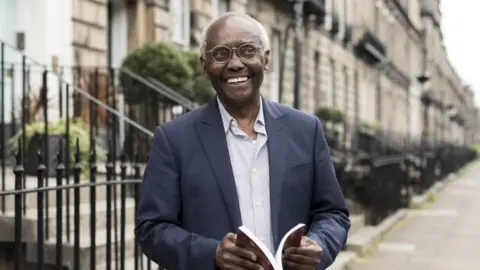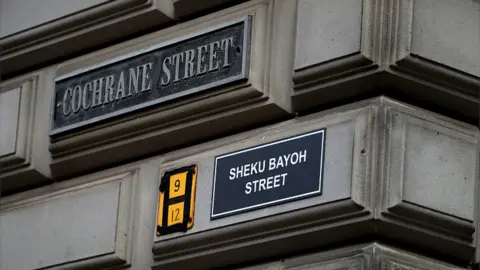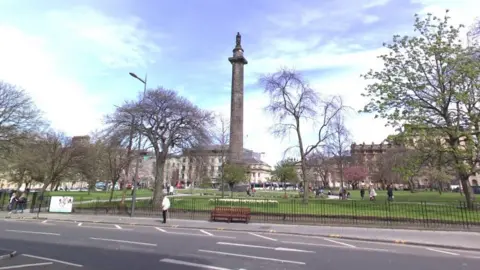Call for plaques on Scotland's statues with links to slavery
 Alicia Bruce
Alicia BruceScotland's first black professor has again called for plaques on Scotland's statues to give a truthful account of their links to the slave trade.
Sir Geoff Palmer, professor emeritus at Heriot-Watt University, said the move could help educate school pupils and change attitudes against racism.
He previously called for a plaque under Edinburgh's Melville Monument, which honours slave owner Henry Dundas.
It comes after campaigners renamed streets in Glasgow city centre.
Activists replaced the names of tobacco merchants and slave trade owners in favour of black campaigners, slaves and those who died in police custody.
 PA Media
PA MediaSir Geoff has previously argued that Edinburgh's economic transformation at the end of the 18th Century was a result of slave ownership and that Scotland had a higher share of the trade by population than England or most European countries.
By 1817, 32% of Jamaican plantations were owned by Scots.
Numerous statues and street names are still in place across Scotland honouring figures who perpetuated such atrocities.
Henry Dundas for example, one of the country's most influential politicians in the 18th and 19th centuries, played a pivotal role in delaying the abolition of slavery - forcing about 630,000 slaves to wait more than a decade for their freedom.
 Google
GoogleSir Geoff told BBC Scotland that adding clarifications to these monuments, rather than pulling them down altogether, would avoid erasing history.
"I don't want statues to be taken down. My view is you remove the evidence, you remove the deed," he said.
"The past has consequences and a lot of people forget that. Racism is a consequence of the past.
"You may take street names away but we have difficulty convincing people about the past. Removing it is very tricky because we are altering history."
Sir Geoff spoke after anti-racism protestors tore down a statue of a slave trader and threw it into Bristol harbour over the weekend.
He acknowledged that adding plaques to every statue in Scotland would be a difficult ask - he first pushed the council to add a plaque to the Melville Monument two years ago and a decision has yet to be made on the matter.
However he argued this is a better alternative to tearing down monuments out of "guilt".
He said: "If we take something down, in 100 years' time, will they thank us for it? They'll want to know why we moved it.
"Was it because we were so guilty because we did nothing about the representation of black people in our society? Is it because we're guilty about a white policeman with his knee on the neck of a black person?"
Scotland's Justice Secretary Humza Yousaf told Good Morning Scotland his view was that abolitionists and anti-racism campaigners should be celebrated through monuments.
However he said the question over whether to remove the landmarks that point to a dark past was a decision for councils.
He added: "Why do we still have statues up of slave owners? I do scratch my head at that.
"It would be for councils to make the decision to take them down, it would be a conversation worth engaging in."
